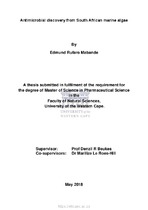Antimicrobial discovery from South African marine algae
Abstract
Antimicrobials are chemical compounds that destroy or inhibit the growth of microorganisms.
The majority of these antimicrobials are actually natural products or natural product derived
with key examples being the pioneer antibiotics penicillin and cephalosporin. Antimicrobials
are an extremely important class of therapeutic agents; however, the development of drug
resistance and slow pace of new antibiotic discovery is one of the major health issues facing
the world today. There is therefore a crucial need to discover and develop new antibacterial
agents. In this study, the potential of marine algae as a source of new antibiotics was explored.
Crude organic extracts and chromatographic fractions obtained from small-scale extraction of
17 different marine algae were used to prepare a pre-fractionated library that would be tested
against several disease causing microorganisms. The activity of the pre-fractionated library and
purified compounds was determined against a panel of drug resistant microorganisms namely
Acinetobacter baumannii ATCCBAA®-1605™, Enterococcus faecalis ATCC® 51299™,
Escherichia coli ATCC® 25922™, Staphylococcus aureus subsp. aureus ATCC® 33591™ and
Candida albicans ATCC® 24433™. Finally, cytotoxicity tests of 50 selected library extracts
and isolated compounds were done against two cell lines namely MCF-7 (breast cancer) and
HEK-293 (kidney embryonic).
Based on their antimicrobial activity and interesting chemical profiles, the seaweeds
Plocamium sp. and Stypopodium multipartitum were selected for further study. Three new and
unusual halogenated monoterpenes (4.16, 4.17 and 4.18) were isolated from Plocamium sp.,
and an unusual meroditerpenoid (5.8) was isolated from Stypopodium multipartitum. The
metabolites were purified using preparative (silica gel) chromatography as well as semipreparative
normal phase HPLC. The structures of purified compounds were determined from
spectroscopic data, including nuclear magnetic resonance (NMR) spectroscopy.
A small library of 153 fractions was generated from collections of South African marine algae.
Pre-fractionated crude extracts showed excellent antimicrobial activity against all microbes but
particularly against Staphylococcus aureus. The compounds were generally active against the
Gram positive bacteria and the yeast. In conclusion, three antimicrobial halogenated
monoterpenes and an unusual monoterpene were isolated from a Plocamium sp. and
Stypopodium multipartitum respectively. Antimicrobial activity of crude fractions was
excellent but that of isolated compounds was not as great as anticipated.

